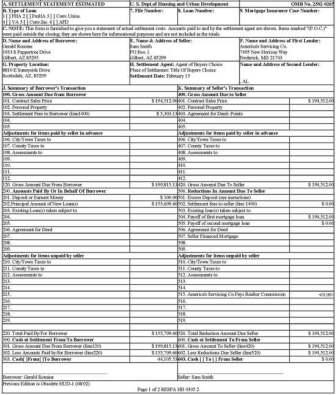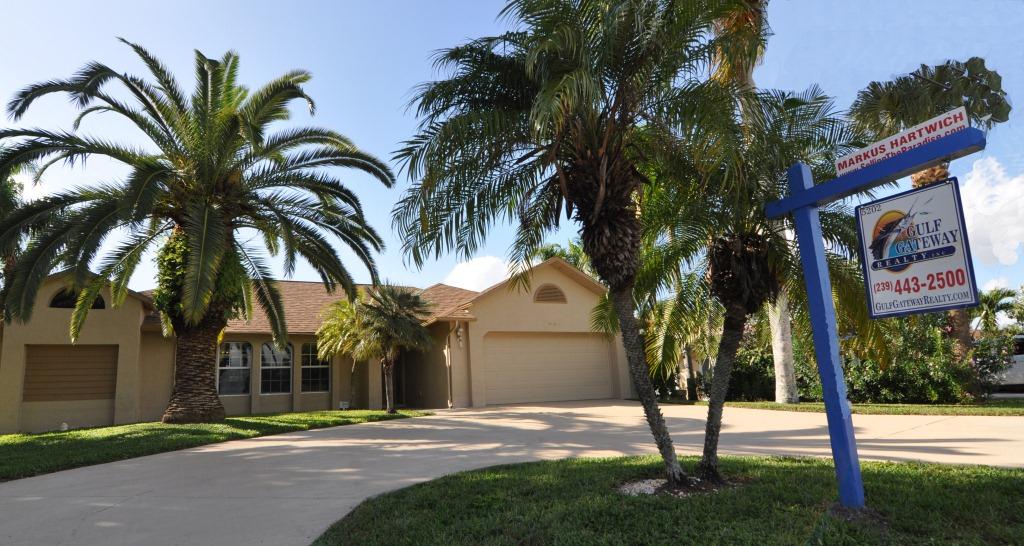The Process of Selling Real Estate in Florida
First Contact
During a first meeting I will look at your property to allow for a more detailed evaluation later. During this conversation you will receive all the details of the sales process as well as an overview of the marketing measures that we plan for the property.
 Listing Agreement
Listing Agreement
As soon as we agree on our cooperation, the listing agreement will be drawn up, which will define the necessary framework and terms. In it the rights and obligations of the owner and the real estate agent are declared.
The listing price is set forth herein as well after a detailed market analysis that uses comparable sales in your neighborhood was presented to you. We also need to define additional information for the property and need to decide on whether furniture or other items will be listed for sale along with the home. This often occurs with international owners, as it is pointless to keep furniture and other items beyond the sale.
Preparation of the MLS listing
Once we have a signed listing agreement our work begins. In a short time we will have professional pictures, videos and if necessary drone footage taken in order to add this to the listing for marketing purposes. Furthermore an electronic key box is attached to the house which allows each broker to show the house to their clients after the prior scheduling of an appointment with our office. At the same time, we will have a for sale sign installed in the front yard so that passing visitors who like to choose the neighborhoods in which they want to live can contact us directly. In the case of waterfront properties we will place a sign at the canal, too. Before we list the property things such as cleaning, repairs, improvements to the exterior of the house should be finished in order to increase the curb appeal for potential buyers.
The Marketing
After the MLS listing is activated, it can be seen on hundreds if not thousands of websites worldwide within a few days. In the meantime we will preapre the online marketing through real estate websites, partner brokerages, social media and other real estate portals as all clients these days start looking for properties online. While we hope for quick and numerous showing requests from other brokers we will also inform leads in our prospective customer base. Sometimes it happens that the buyer is found by the listing agent.
The Purchase Offer
Should a buyer like your property, a written offer will be submitted to me by the buyer's agent. The contracts are in most cases standard FAR-BAR contracts issued by the Florida Association of Realtors (FAR) and the Florida BAR. Herein all terms such as purchase price, deposit, inspection period, date of transfer of ownership ("closing") etc. will be stated. With the offer there could be further documents, e.g. a prequalification for financing or a proof of funds for a cash purchase. If you have provided voluntary information about the condition of the property (Seller's Disclosure) this will also be attached and signed off by the buyer. Most of these disclosures serve to protect buyers but at the same time give them a good feeling about the disclosure of the seller about known damages or defects. The buyer's agent submits the offer to me and I present the document to you and explain the terms of the offer. In the offer is the deadline for your response which is usually expected within 24-48 hours. Within this time frame you can accept the offer, reject it or respond with a counteroffer.
Your Response
Upon acceptance of the offer without any change in the conditions offered, the document automatically becomes the contract which is then binding for both sides and will accompany us until the end of the transaction. You can reject the offer without a counteroffer which is not conducive to the flow of negotiations. If you change one or more conditions in the offer we speak of a counteroffer. Now the buyer can refuse, accept or counter. Very often these negotiations are done verbally between the agents up to a meeting of the minds. Then the final contract will be signed by both parties.

The Acceptance of the (counter)offer
As soon as the last party signs the counter(offer), a legally binding contract comes into existence. The effective date in it is the date we call day zero and starting from which all deadlines specified in the contract are caluclated, e.g. for escrow deposit, home inspection etc.
A vacant land contract and a house contract are of course different in nature. Also the time periods are handled differently, i.e. calendar days in one contract means business days in the other.
That is why you need a Realtor who puts a lot of emphasis on accuracy so that no important deadlines pass and you thereby suffer a disadvantage. Your protection is my job! The contract is then immediately forwarded to the title company which opens the file.
The Lender
If the property is being financed the lender will also receive a copy of the contract. The lender will now order an appraisal and a survey for the property.
The Escrow deposit

Depending on what the contract says, the escrow deposit can be made in different ways: either directly upon acceptance of the contract, within a period of a few days or even divided into 2 separate payments. Thus you can take into account the time needed for funds to arrive which may need to be transferred from abroad. This deposit is transferred to the escrow account of the title company which is responsible for the closing. Customarily, you choose this independent third party and therefore pay all fees for it. Upon receipt of the deposit the title company issues a confirmation which is sent to both parties. Usually amounts of between two and five percent of the purchase price are offered unless you have requested this differently in the listing. At this time (in case you are a foreign national/international seller) you have to involve your tax professional and start dealing with the FIRPTA withholding.
The Home or Property inspection
Within the agreed inspection period for a home, or the feasibility study period for vacant land, licensed Inspectors or Surveyors will now conduct inspections and surveys on behalf of the buyer to determine if the property is suitable for the buyer. The home inspection is carried out by a specialist who checks the property and creates a written report about the current condition of the house. Furthermore, inspections can be carried out for the presence of mold, termites, lead-based paint in homes constructed before 1978 or Chinese drywall.
You have nothing to worry about here as the inspection is up to the buyer. If you do not hear anything from the buyer within the period of inspection of the house the contract becomes fully binding for him. If defects are found that the buyer has not included in his offer, or that are hidden and were not visible at the time of showing, he will ask you to either repair the damage or to agree to a price reduction. In most cases, you can negotiate one of these options but you have to know that with the AS-IS contract you are under no obligation to repair anything or reduce the sale price. If you do not agree to any of those options it may happen that the buyer cancels the contract and subsequently receives his deposit back. If a mutual agreement was found or the inspection period runs out without a request from the buyer the transaction continues.
The Appraisal
In the case of financing the lender will order an appraiser to estimate the market value of your property. If the appraisal confirms the sale price then a conditional loan approval is given (of course further requirements have to be met by the borrower).
The Title search and Clarification of ownership
When all this is done, the title company will start their work. As you choose the title company you will cover not only the entire cost of the closing (in a financing scenario the buyer will pay their portion) but also the issuance of the title insurance. The title company immediately checks public records and other systems at their disposal to find out whether any legal claims against the property are existing and recorded. They also clarify the amount of a potential mortgage payoff and whether there are any open "assessments", e.g. city utility assessments. Then the title commitment is issued.
This protects the buyer against any legal claims of third parties. The actual insurer stands in the background and controls the operation and handling of the transaction through the title company - they are called "underwriter". Now all necessary documents for the transfer of ownership are prepared.
The Loan commitment
If all the borrower's data has been positively audited and checked by the bank the loan commitment is issued which removes the financing contingency from the contract.
 The Settlement Statement (HUD)
The Settlement Statement (HUD)
In time the title company will prepare the Settlement Statement. Herein all positions that will have to be paid and will be credited to either buyer or seller will be shown. It will reflect the escrow deposit, the commissions, prorated taxes and assessments as well as invoices from third parties like the home inspector and all charges from the lender. For the tax proration, you have to bear in mind that taxes will be paid in arrears, whereas stormwater fee, fire assessment or solid waste fees as well as homeowner insurance has to paid in advance. The stated amount at the bottom shows the net proceeds to you and the total amount payable by the buyer.
The remaining funds have to be transferred to the escrow account by the buyer until the day of closing. Also until that day either the documents have to be delivered notarized from either party or appointments have been made to sign all documents and get them notarized in front of the title company. If you are abroad, the documents must be signed at your current whereabouts at either a notary public, attorney or the American embassy/consulate and sent back as originals by courier to the title company.
The Final Walkthrough
At the day of closing there will be a final walkthrough at the property. Either the Realtor does that on behalf of the buyer or it is done together. It serves to make sure that the property is still in the same condition as it was at the time of showing. This way the buyer can ensure that all household items, furniture or appliances are still there as are stated in the contract. At this time you have removed all personal items or anything that is not included in the contract as well as garbage from the property.
 The Closing and Transfer of Ownership
The Closing and Transfer of Ownership
Up to this day the buyer can transfer the remaining amount to the escrow account. If this happens by 5 p.m. local time, everything is fine even if the closing due to the late arrival of the funds has to be done the next day especially when financing is involved and the bank's funds are still missing. At the closing, the buyer or the buyer's agent will be handed over the keys and garage door openers.
You can terminate services like water and electricity for the day of closing. The Transfer of Ownership is being done by means of a deed. This deed will be recorded at the Division of Public Records and is publicly viewable at www.leepa.org.






